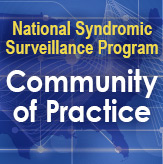DeKalb County, Georgia, Uses Syndromic Data to Identify Chlorine Gas Exposure at a Swimming Pool
Environmental Exposure

Chlorine gas exposure is not the first thing that comes to mind when thinking of swimming pool safety. However, for parents of children at a swim meet in DeKalb County, Georgia, it became a frightening reality. Syndromic surveillance data alerted Georgia’s Department of Public Health to a dangerous exposure to the gas after several children visited local emergency departments with symptoms of coughing and difficulty breathing. Health officials noticed that patients shared common symptoms and alerted the county board of health.
Environmental health workers found violations at the pool, resulting in a temporary closure and an opportunity to educate the pool company on proper and safe pool management. Funding from the National Syndromic Surveillance Program supports the use of syndromic surveillance in improving the nation’s public health.
Public Health Problem
On Saturday, May 19, 2018, during a routine visit at a community pool in DeKalb County, Georgia, technicians from a pool company observed that one of two pumps was not working properly and there was no chlorine in the water. They hand-fed granular chlorine into the pool through the skimmers and opened the pool. A swim meet began about an hour later. Several children were exposed to chlorine gas. Low-level exposure to chlorine gas can result in nose, throat, and eye irritation. At high levels of exposure, breathing chlorine gas can cause difficulty breathing or shortness of breath, coughing, and lung damage.
Actions Taken
On Monday, May 21, 2018, the Georgia Department of Public Health’s syndromic surveillance coordinator noticed anomalies in DeKalb County data. Two days earlier, seven patients ages 10 to 12 who lived in adjacent DeKalb County ZIP codes were seen at two emergency departments within a 24-minute period. They complained of breathing problems, and their parents suspected chemical exposure. The coordinator notified the DeKalb County Board of Health.
The Board of Health’s Environmental Health epidemiologist determined, via chart abstraction and parent interviews, that the patients had been exposed to an unknown gas during a local swim meet on the previous Saturday. The parents reported that the meet started around 10 a.m. and the children became symptomatic around 10:45 a.m. They called emergency medical services, which assessed and treated the children before transferring several to emergency departments, while others were taken by private car. Arrival times ranged from 12:50 PM to 1:14 PM. Seven children had predominant symptoms of coughing and difficulty breathing. Most (88%) were males. They were observed for 1 to 2 hours and discharged. The epidemiologist notified the Environmental Health county supervisor who, in turn, spoke with the pool company’s vice president.
County code states that all pumps must be operational and that the disinfectant residual must always be maintained. Not meeting either criteria is considered an imminent health hazard requiring immediate closure of the pool. Here, the granular chlorine mixed with water in the skimmers to produce chlorine gas. During an inspection on Tuesday, May 22, 2018, the county supervisor identified this and other violations and immediately closed the pool.
Outcome
Syndromic surveillance helped identify and close a pool in violation of health codes—protecting the public’s health. Syndromic data led to rapid identification of emergency department patients who shared common symptoms. State and local public health agencies (Georgia Department of Public Health and DeKalb County Board of Health) and various disciplines (epidemiology and environmental health) communicated effectively. Once local Environmental Health staff were alerted, they investigated and determined the cause of patients’ illnesses and closed the pool to prevent additional exposures. Staff followed up by ensuring the pool owner and management company took corrective action before reopening the pool. Environmental Health staff educated the pool company on proper and safe pool management according to county code, benefitting swimmers at this pool and other pools throughout the summer and beyond.
Lessons Learned
- There’s value in using routine state-level syndromic surveillance to identify local-level clusters and outbreaks that might not otherwise be detected.
- Effective communication between state and local public health agencies can enable swift action to prevent further illness. Good teamwork between and within levels of the public health system contribute to the mission of helping the public achieve the best possible health.
Contacts
Environmental Health Epidemiologist,
DeKalb County Board of Health
mandy.seaman@dph.ga.gov
Office of Public Health Data, Surveillance, and Technology
Division of Health Informatics and Surveillance
www.cdc.gov/nssp
This success story shows how NSSP
- Improves Data Representativeness
- Improves Data Quality, Timeliness, and Use
- Strengthens Syndromic Surveillance Practice
- Informs Public Health Action or Response
The findings and outcomes described in this syndromic success story are those of the authors and do not necessarily represent the official position of the National Syndromic Surveillance Program or the Centers for Disease Control and Prevention.
